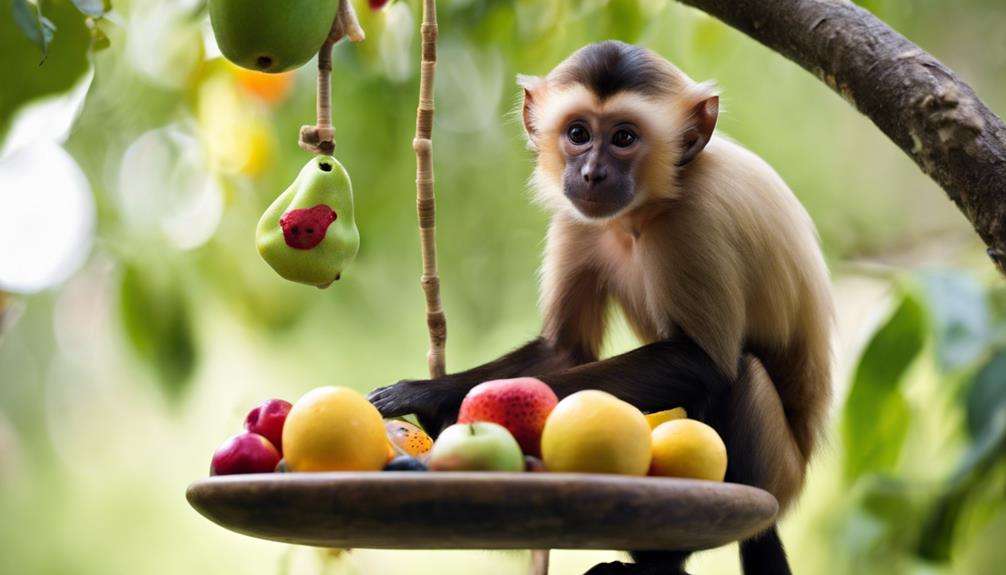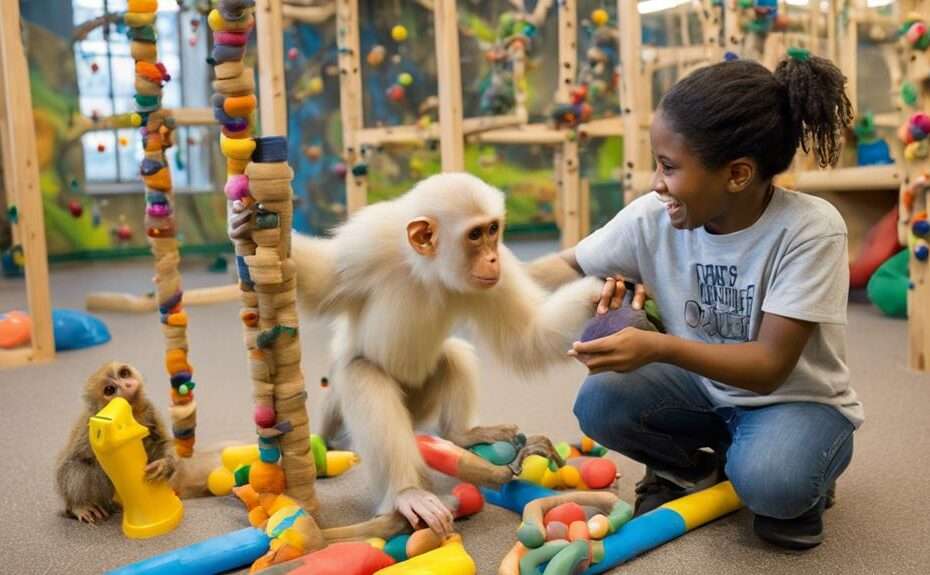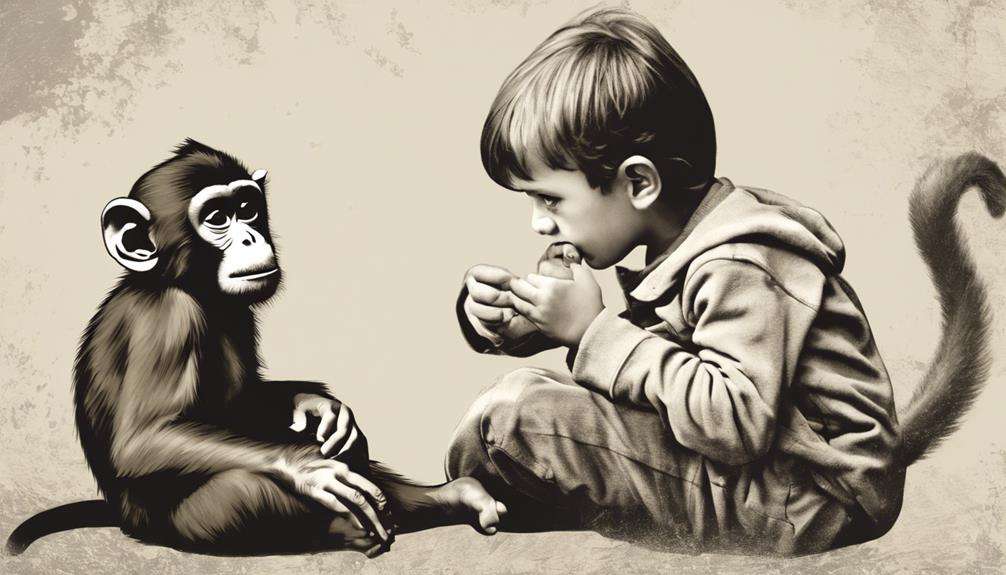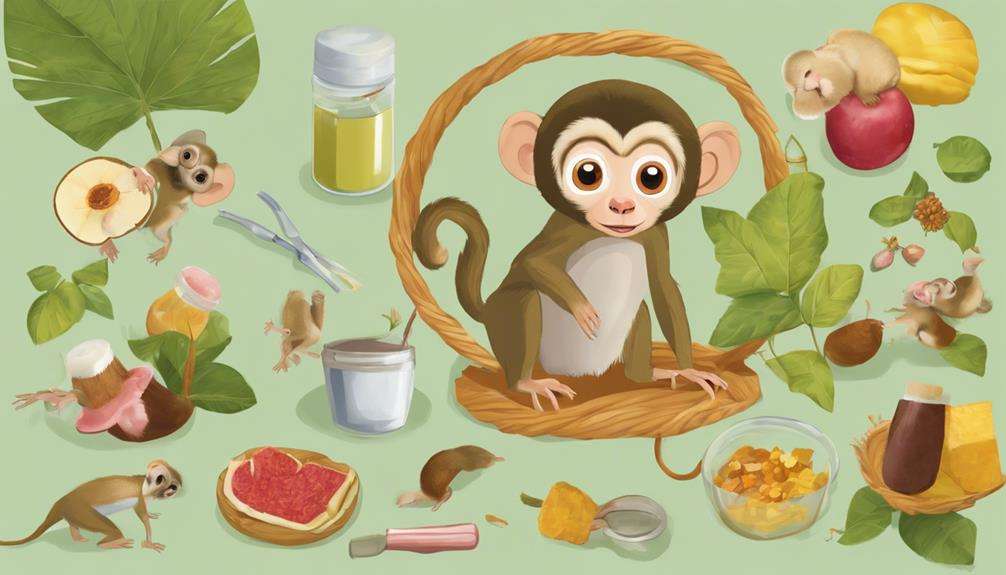Considering a primate as a pet?
You may have heard that primates can form deep bonds with their human owners, but there's more to understand before taking the plunge into primate ownership.
From specialized care requirements to the legalities involved, exploring the world of unique primates can be both rewarding and complex.
Before you make any decisions, there are important tips and insights that could make all the difference in your primate ownership journey.
Key Takeaways
- Understand species-specific care guidelines for primates.
- Implement positive reinforcement and enrichment activities in training.
- Provide diverse diets, mental stimulation, and suitable enclosures.
- Seek advice from experienced owners and prioritize primate well-being.
Unconventional Primate Options
When considering unconventional primate options for first-time ownership, exploring species like Marmosets and Tamarins can provide unique and rewarding pet experiences.
Marmosets, known for their small size, require specialized care akin to looking after toddlers. Their delicate nature and specific dietary needs necessitate vital attention to detail. Providing them with a suitable environment and nutrition is vital for their well-being.
Tamarins, even smaller than Marmosets, thrive in secure enclosures that cater to their need for mental stimulation and natural behaviors. Owners must create enriching environments that promote the physical and mental health of these unconventional pet primates.
Understanding the distinctions between Marmosets and Tamarins is essential for first-time owners to choose the right primate that aligns with their lifestyle and preferences. By offering the proper care, attention, and specific diets, Marmosets and Tamarins can flourish in captivity, enriching the lives of their owners with their unique personalities and behaviors.
Factors to Consider Before Owning
Before committing to owning a primate, carefully consider important factors that will impact your lifestyle and long-term responsibilities. Pet monkeys require specialized care, including specific diets tailored to their nutritional needs, appropriate enclosures that mimic their natural habitat, and daily social interaction to prevent boredom and promote their well-being.
It's critical to understand that owning a primate is a long-term commitment due to their lifespan, which can range from 15 to 60 years. Additionally, research legal restrictions in your area regarding pet monkeys, as permits may be required, and fines could be imposed for non-compliance.
Be prepared for the challenges and risks associated with owning a primate, such as potential aggression, high costs of care, and the difficulty of finding veterinarians experienced in monkey care. Consider factors like space requirements, the extended lifespan of primates, and the possibility of dealing with aggressive behaviors before deciding to bring a primate into your home.
Capuchin Monkey Care Essentials

Are you prepared to meet the complex care needs of a Capuchin monkey, known for their intelligence and mischievous behavior?
Capuchin monkeys are unique creatures that require specialized care due to their high intelligence levels and social nature. As intelligent primates, they need mental stimulation to prevent boredom and behavioral issues. Capuchins have an average lifespan of around 40 years, so be ready for a long-term commitment.
These monkeys also require diapers throughout their lives, as they can be challenging to toilet train due to their territorial instincts. While they're often seen in entertainment, owning a Capuchin monkey isn't all fun and games; it comes with responsibilities and challenges.
Understanding their unique needs and providing them with proper care, social interaction, and mental stimulation are critical for their well-being. Make sure you're fully prepared to dedicate the time and effort required to guarantee a happy and healthy life for your Capuchin monkey companion.
Chimpanzee Behavior and Training Tips
Capuchin monkey care essentials highlight the need for specialized attention due to their high intelligence levels, a trait also observed in chimpanzees, which exhibit intricate social behaviors and require tailored training approaches. When training chimpanzees, it's important to use positive reinforcement techniques to teach them basic commands and behaviors effectively. Due to their complex social structures, understanding chimpanzee body language and vocalizations is essential for successful communication and relationship-building. Additionally, chimpanzees can display aggressive behaviors, particularly during adolescence and adulthood, necessitating careful management strategies and specialized training interventions.
To ensure the mental well-being of chimpanzees, enrichment activities play a significant role in preventing boredom and promoting cognitive stimulation. Enrichment activities such as puzzle feeders, foraging games, and interactive toys are highly recommended to keep these intelligent primates engaged and content. By incorporating these training techniques and enrichment activities into their daily routines, primate owners can foster a positive environment that supports the social and cognitive needs of chimpanzees.
Macaque Diet and Enrichment Ideas

When caring for macaques in captivity, it's essential to provide a diet rich in fruits, vegetables, nuts, seeds, and a protein source to guarantee their health and well-being. Macaques thrive on a diverse diet that includes leafy greens, berries, and insects to enhance their nutritional intake.
For enrichment ideas, consider incorporating puzzle feeders, climbing structures, and toys to stimulate their natural behaviors. Engaging macaques in foraging activities is vital for their mental stimulation, physical exercise, and overall well-being.
By varying their feeding methods and presenting food in different ways, you can prevent boredom and promote a healthy lifestyle for your macaques in captivity. Remember, macaques benefit greatly from food enrichment activities that mimic their natural foraging instincts, ensuring they remain active and engaged in their environment.
Providing a balanced diet and offering enrichment opportunities are key aspects of caring for macaques and fostering their overall health and happiness.
Tamarin Socialization and Bonding Techniques
When it comes to tamarin socialization, understanding the basics is key to fostering strong relationships.
Engaging in bonding activities tailored for tamarins can help strengthen the connection between you and your primate companion.
Building trust through consistent positive interactions and care is fundamental for the well-being and happiness of tamarins.
Tamarin Socialization Basics
To facilitate prime tamarin socialization and bonding, dedicate time daily to engage in interactive activities that promote trust and natural behaviors. Tamarins, being highly social creatures, rely on strong bonds within their family groups. Socialization is important for their well-being, helping them develop trust, reduce stress, and exhibit their natural behaviors.
Utilize enrichment activities to create a stimulating environment that encourages communication through vocalizations, grooming, and physical contact. By spending quality time with your tamarins, you'll strengthen social bonds and help them feel secure. Proper socialization not only enhances their overall well-being but also allows them to express their natural behaviors freely.
Prioritize these bonding techniques to make a harmonious relationship with your tamarins.
Bonding Activities for Tamarins
Engage your tamarins in grooming, playing, and vocalizing to strengthen their social bonds and foster a sense of community within their group. These socialization activities are key bonding techniques for tamarins, enhancing their mental well-being and social cohesion.
Mutual grooming is particularly important as it not only helps in hygiene but also reinforces social bonds. Tamarins exhibit complex communication during these activities, using vocalizations, gestures, and facial expressions to connect with their group members.
Building Trust With Tamarins
Establishing trust with tamarins is a gradual process that requires consistent interaction and positive reinforcement through quality time spent together and offering treats. Tamarins, being social creatures that form strong bonds within their family groups, value spending quality time to communicate through vocalizations, grooming, and play, which are essential for bonding.
To build trust effectively, provide a safe environment that's enriched with opportunities for socialization. Remember that consistency, patience, and respect for their natural behaviors are key to fostering a strong bond with tamarins. By maintaining a routine of positive interactions, such as offering treats and engaging in playful activities, you can create a trusting relationship with these unique primates.
Understanding Pocket Monkeys
Understanding the intricate care requirements of pocket monkeys is essential for their well-being in captivity. Pocket monkeys, or pygmy marmosets, are highly intelligent creatures that require a lot of social interaction throughout their lives. In the wild, these tiny primates live in family groups, displaying strong bonds and complex communication. As a first-time owner, it's important to provide the best possible environment for your pocket monkey. This includes ensuring ample space for them to move around, climb, and explore.
Since pygmy marmosets are highly social animals, they thrive when well-trained and allowed to interact with their human caregivers regularly. In captivity, it's essential to replicate their natural habitat as closely as possible. This includes offering a diverse diet that mimics what they'd eat in the wild, such as tree sap, insects, fruits, and nectar. By understanding and meeting the unique needs of pocket monkeys, you can create a fulfilling and enriching environment for these fascinating creatures.
Squirrel Monkey Housing Requirements

To meet the housing requirements of squirrel monkeys, make sure that their enclosures provide ample vertical space for climbing and swinging activities. Squirrel monkeys are highly active and arboreal creatures, so spacious enclosures with opportunities for vertical movement are essential for their well-being. Incorporating branches, ropes, and platforms into their living space mimics their natural habitat and encourages natural behaviors.
To guarantee mental stimulation, include hiding spots and enrichment activities such as puzzles and foraging toys to keep these intelligent primates engaged.
In addition to physical enrichment, access to natural sunlight or UVB lighting is essential for squirrel monkeys' health and overall well-being. Proper temperature control within their enclosure is also crucial since squirrel monkeys are sensitive to extreme cold or heat. Maintaining a comfortable and stable temperature range will help ensure that your squirrel monkey remains healthy and happy in its environment.
Frequently Asked Questions
What Is the Friendliest Monkey to Have as a Pet?
The capuchin monkey is often considered one of the friendliest monkey breeds to have as a pet. Their intelligence, affectionate nature, and ability to bond with humans make them compatible pets. Proper training, socialization, and attention are essential for a harmonious relationship.
What Are at Least Four Traits That Are Unique to the Primate Order?
Do you know what sets primates apart? Their complex social structures, intelligence, communication skills, and arboreal adaptations make them unique. Understanding primate behavior, socialization, intelligence, and agility is key for first-time owners.
What Do I Need to Know Before Adopting a Monkey?
Before adopting a monkey, you should research monkey care, dietary needs, training, and socialization techniques. Be aware of common health issues and legal ownership requirements. Building a bond with your monkey and providing mental enrichment are essential.
How Hard Is It to Own a Monkey?
Owning a monkey can be tough. You'll face training challenges, legal requirements, and health concerns. The bonding process and socialization needs are essential. Enrichment activities are a must for their well-being. Be prepared!
Conclusion
Congratulations on taking the first step towards primate ownership. Remember, like a delicate symphony, caring for these unique creatures requires harmony, dedication, and patience.
By following the tips and insights provided in this guide, you can create a sanctuary where your primate companion can begin. Embrace the challenges, savor the joys, and always prioritize the well-being of your special primate friend.
Together, you can start on a truly unforgettable journey filled with love and learning.






